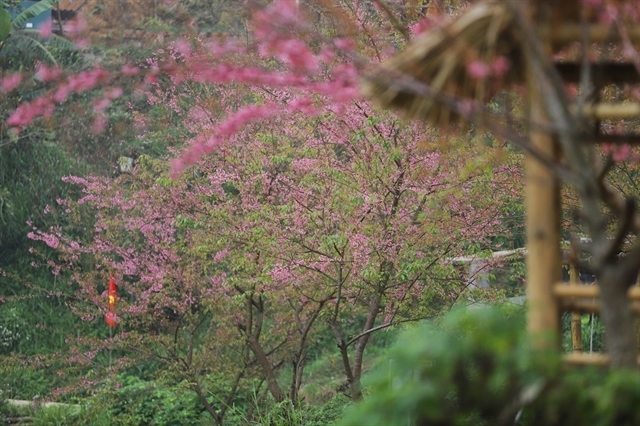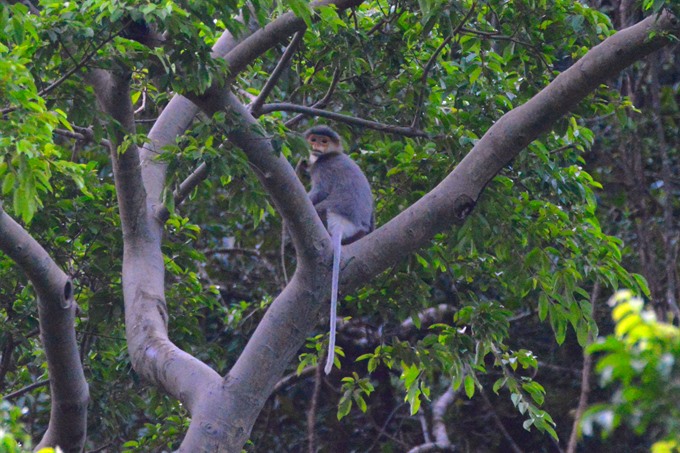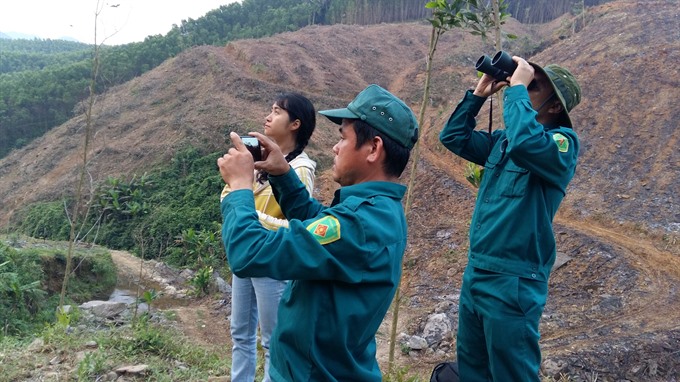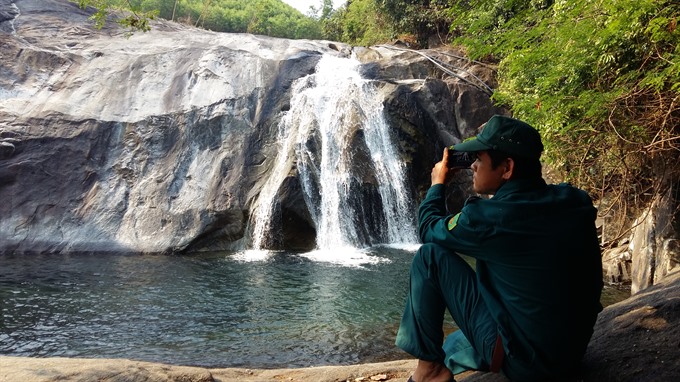 Features
Features

A farming community in the central province of Quảng Nam has been volunteering to protect a critically endangered troupe of gray-shanked douc langurs (pygathrix cinerea) that have made the area their home.
 |
| A gray-shanked douc langur (pygathrix cinerea) is snapped in a forest in Quảng Nam Province’s Núi Thành District. — VNS Photo Ái Tâm |
A farming community in the central province of Quảng Nam has been volunteering to protect a critically endangered troupe of gray-shanked douc langurs (pygathrix cinerea) that have made the area their home.
The troupe, with an estimated 50 individuals, has been living peacefully in a 5ha area of forest in Tam Mỹ Tây Commune, where villagers protect them from poachers.
“I saw them (langurs) the first time when I was on the way to find firewood in the forest. I knew they were monkeys, but didn’t realize they were endangered langurs. They lived high in the trees, and we could only get within 30m,” Nguyễn Dư, 38, said.
“More than 200 villagers have agreed to protect the langurs by assigning members of families to patrol day and night,” he said.
“The guards patrol a logging facility and keep a close eye on the langurs,” he explained.
Dư said the guards did not receive payment for protecting the langurs.
Lương Thanh Vân, another local, said: “The village has peacefully sheltered by Dồ Mountain for generations, and we think of the mountain and forest as the Gods of the village as well as the langurs.”
“The primates and wildlife are hunted for luxury meals or bones used for medicine. Hunting is banned in the community, but poachers from neighbouring villages still came to hunt them,” Vân said.
Võ Ngọc Danh, 59, was happy to be given the opportunity to protect the langurs, even though he was busy on his farm.
“I meet them (the langurs) every morning on the farm. The langurs seem to recognise us now and have been living with the community for decades,” he said.
“Villagers treat them as good friends from the jungle,” he said.
 |
| Local villagers patrol the jungle daily to protect the endangered species in Quảng Nam Province. — VNS Photo Công Thành |
 |
| Hố Giang Thơm hot springs is set to become an eco-tourism site. — VNS Photo Công Thành |
Phan Minh Huấn, head of Núi Thành District’s ranger station, said villagers informed them about illegal hunting whenever they suspected poaching.
“Our ranger force is assigned to cover more than 26,000ha of forest in the district, so communication with the local community has helped us promote forest protection,” Huấn said.
“The endangered langurs have sheltered in a large forest area, but their habitat has been narrowed due to the expansion of logging in recent years. That’s the reason the local rangers and community are working to stop humans from encroaching more on their territory,” he added.
Huấn said the province planned to turn the Hố Giang Thơm hot springs into an eco-tourism resort, and the conservation of the endangered langurs would help promote tourism and change the community’s livelihood from forestry to tourism services.
Vice chairman of Núi Thành District People’s Committee Nguyễn Văn Thịnh said the province had extended a strict protected area for the langurs.
Thịnh said the conservation of the endangered langurs aimed to limit the damage caused by human activities and restore the natural habitat for the primates.
He said the langurs would lure biologists to the area, and promote sustainable eco-tourism services in the poverty-stricken region.
The province planned to allocate funds for the volunteers and rangers to help them protect the langurs, Thịnh added.
According to Trần Hữu Vỹ, director of the Centre of Biodiversity Conservation, the langurs need special protection as rapid logging had damaged their habitat.
Vỹ said the centre, in co-operation with the province, had been doing a biodiversity assessment of the langur habitat before launching a master plan on the conservation of the langurs and other fauna and flora species in the area.
Experts from the Frankfurt Zoological Society’s Việt Nam Primate Conservation Programme said around 1,000 gray-shanked doucs were living in forests in the provinces of Quảng Nam, Quảng Ngãi, Bình Định, Kon Tum and Gia Lai.
Expert Hà Thăng Long, head of the representative office of the Frankfurt Zoological Society in Việt Nam, said the gray-shanked douc langur, which can only be found in Việt Nam, is listed on the International Union for Conservation of Nature (IUNC) Red List as one of the world’s 25 Critically Endangered primates. — VNS




